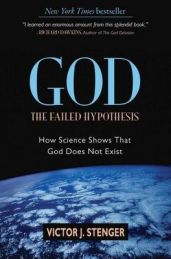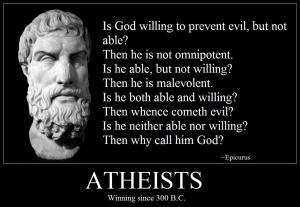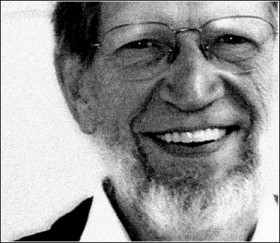I suppose it must be true for most areas of life but it’s sometimes hard to take when one sees such a disparity between where academics are in relation to popular cultural ideas. I find it staggering that many atheists (and some fideistic theists too for that matter) appear to think the logical problem of evil is a clear defeator to classic monotheism. They might have seen a pictorial meme or two such as:
I am not going to overview the problem now but a very good summary of it including Alvin Plantinga’s response can be found here on the Internet Encyclopedia of Philosophy:
[There is, in my humble opinion, one serious error in that article but I will note my concern at the bottom of this post as a ‘PS’ rather than now.]
This is a very nice five minute introduction to the logical problem if you want a reminder:
All I wish to do in this post is collate some comments made by atheist and agnostic philosophers who warn against using logical formulations of the problems of evil due to the pitfalls they encounter, the burden they struggle to meet and the persuasive answers which have been given in reply to them.
Atheist philosopher William Rowe notes:
“Some philosophers have contended that the existence of evil is logically inconsistent with the existence of the theistic God. No one, I think, has succeeded in establishing such an extravagant claim. Indeed, granted incompatibilism, there is a fairly compelling argument for the view that the existence of evil is logically consistent with the existence of the theistic God. (For a lucid statement of this argument see Alvin Plantinga, ‘God, Freedom, and Evil’ (New York, 1974), pp. 29-59.”
William Rowe, ‘The Problem of Evil and Some Varieties of Atheism’ p. 335
Agnostic philosopher Paul Draper explains:
“Although logical arguments from evil seemed promising to a number of philosophers in the 1950s and 1960s (eg. Mackie 1955), they are rejected by the vast majority of contempoary philosophers of religion, for two reasons. First, some serious attempts have been made to demonstrate that the existence of evil and several other more specific facts about evil are logically compatible with God’s existence. For example, Alvin Plantinga’s (1974) influential ‘Free Will Defense’ persuaded many that it is logically possible that God exists, that God creates people with morally significant free will, and that some of those people make morally bad choices. If Plantinga is right that this is logically possible, then God’s existence is logically compatible with the existence of evil and (more specifically) with the existence of moral evil.”
“In order for a logical argument from evil to succeed, it is necessary to show that, for some known fact about evil, it is logically impossible for God to have a good moral reason to permit that fact to obtain. This, however, is precisely what most philosophers nowadays believe cannot be shown.”
Paul Draper, ‘The Problem of Evil’
in ‘The Oxford Handbook of Philosophical Theology’ p.335
Atheist philosopher Michael Martin states:
“Atheologians have usually construed this [viz. the logical problem of evil] as a deductive argument. They have, in other words, attempted to show that the conjunction of the following statements is inconsistent:
[1] God is all-powerful and all-knowing.
[2] God is all-good.
[3] Evil exists.
However, this approach has generally been regarded as unsuccessful. The logical compatibility of [1], [2], and [3] is suggested by the following considerations.
[1] entails [1′] God could prevent evil unless evil was logically necessary.
and [2] entails [2′] God would prevent evil unless God had a morally sufficient reason to allow it.
[1′] and [2′] combined entail [3′] Evil exists only if either God has a morally sufficient reason to allow it or it is logically necessary.
[3′] does not conflict with [1] or [2].
Because of the failure of deductive arguments from evil, atheologians have developed inductive or probabilistic arguments from evil for the nonexistence of God.”
Michael Martin, ‘Atheism: A Philosophical Justification’ p.335
Atheist philosopher Nicholas Everitt says:
“The basic form of logical problem of evil which is put to the theist is this. She will have to accept:
[1] the world contains evil because the presence of evil is so obvious.
[2] God is omnipotent
[3] God is omniscient
[4] God is morally perfect
What is distinctive about the logical problem is that it asserts that [1]-[4] form a self-contradictory set. Plantinga argues that there is no sense of ‘inconsistent’ or ‘contradictory’ in which [1] to [4] as they stand form an explicitly contradictory set. If they are contradictory at all, they will be at most implicitly contradictory, where that means that if further premises are added, which are themselves necessarily true, an explicit contradiction can be inferred. And Plantinga argues that the atheist who is relying on the problem of evil cannot find any such premises, and hence the logical problem of evil does not show that God does not exist… There is clearly a sense in which Plantinga is right here. Premises [1]-[4] do not form an explicitly contradictory set; and it would be difficult to find any atheist who thought that they did… It turns out to be surprisingly difficult for the atheist to find further propositions which the theist has to accept, and which when added to [1]-[4] give an explicitly inconsistent set. Correlatively, it is difficult for the atheist to extract from [1]-[4] a sound deductive argument for the non-existence of God. Suppose, for example, he tries something like the following:
[5] God is morally perfect
[6] God is omnipotent and omniscient
so [7] God will prevent all the evil that he can (from [5])
and [8] God can prevent all evil (from [6])
so [9] God will prevent all evil (from [7] and [8])
so [10] the world will contain no evil (from [9])
but [11] the world does contain evil.
Plantinga shows convincingly that no sophisticated theist need accept that [5] implies [7], nor that [6] implies [8] as they stand.”
Nicholas Everitt, ‘The non-existence of God’ pp.229,230
Even the founder of the infamous ‘Infidels’ website, Jeffery Jay Lowder, is forced to admit:
“According to logical arguments from evil, some known fact about evil is logically incompatible with God’s existence. (In contrast, evidential arguments from evil merely claim that some known fact about evil is evidence for God’s nonexistence.) Ever since Alvin Plantinga rebutted J. L. Mackie’s logical argument from evil, the majority of contemporary philosophers of religion have come to believe that logical arguments from evil are unsuccessful. This opinion is not unanimous, however. Philosophers Richard Gale, Quentin Smith, and Howard Jordan Sobel challenge the conventional view regarding the prospects for logical arguments from evil. Indeed, Smith has formulated a new version of the logical argument from evil to avoid the pitfalls of Mackie’s argument. Nevertheless, many philosophers remain highly skeptical regarding logical arguments from evil.”
So if you are a theist bored of being presented with the logical problem of evil as if that ends the debate over the existence of God perhaps try pointing your atheist interlocutor to some of these atheist / agnostic sources as a way of opening the discussion back up?
———————
PS. As I see it there is one significant error in the article on the logical problem of evil on the IEP website. In section 8 called ‘Was Plantinga’s Victory Too Easy?’ the author claims this quote from Mackie is a response to Plantinga’s free-will defense:
“Since this defense is formally [that is, logically] possible, and its principle involves no real abandonment of our ordinary view of the opposition between good and evil, we can concede that the problem of evil does not, after all, show that the central doctrines of theism are logically inconsistent with one another. But whether this offers a real solution of the problem is another question.”
J.L. Mackie, ‘The Miracle of Theism’ p.154
However, if you look up the context of that quote Mackie is responding to the theodicy that the existence of evil could be explained in order to achieve greater goods (‘second-order goods’) as one might find in Kant or John Hick (both of whom he mentions within a page of this quote). At this point Mackie has not even mentioned the free-will defense or Plantinga. His interaction with that does not begin until p.162. Thus this quote from Mackie had nothing to do with Plantinga’s free will defense as far as I can see. A small point but worth making I think.
————————-
PPS. Here is an example of a prominent atheist using this form of the argument. Victor Stenger, in his book God: The Failed Hypothesis (note the irony) says:
“The problem of evil can be formally stated as follows:
1. If God exists, then the attributes of God are consistent with the existence of evil.
2. The attributes of God are not consistent with the existence of evil.
3. Therefore, God does not and cannot exist.
Stenger makes it clear that by the “attributes of God” he means: omnibenevolence, omnipotence, and omniscience. He then concludes (after less than half a page of disucssion on the matter):
“The attempt to defend the notion of a God of infinite goodness, power, and wisdom in light of the undeniable existence of pain and suffering in the world is called a theodicy. So far, this attempt has proven unsatisfactory in the judgement of the majority of philosophers and other scholars who have not already committed themselves to God as an act of faith.”
Victor Stenger God: The Failed Hypothesis p.216
 Stenger quotes from Everitt’s book in the very next chapter so it’s more than curious that he fails to engage with Everitt on this. Everitt (who is an authority in the field) suggests the exact opposite in that he thinks it’s hard to find any philosophers defending the logical problem of evil today – even among his fellow atheist philosophers. Stenger has made a declaration about the state of philosophy which he was not careful enough in researching and has therefore got it badly wrong. Stenger’s hypothesis turns out to be the failure.
Stenger quotes from Everitt’s book in the very next chapter so it’s more than curious that he fails to engage with Everitt on this. Everitt (who is an authority in the field) suggests the exact opposite in that he thinks it’s hard to find any philosophers defending the logical problem of evil today – even among his fellow atheist philosophers. Stenger has made a declaration about the state of philosophy which he was not careful enough in researching and has therefore got it badly wrong. Stenger’s hypothesis turns out to be the failure.
Here is a nice little introduction to Plantinga’s response to the logical problem of evil if you don’t know much about it:


Pingback: Arminianism, Calvinism and Atheism | Arminian Perspectives
Pingback: Daring to disagree with Plantinga and Pigliucci | aRemonstrant'sRamblings
Pingback: ARGUMENTY ZA WIARĄ#28 Dlaczego zauważamy autentyczną niesprawiedliwość na świecie? (Argument ze zła) | Znani chrześcijanie